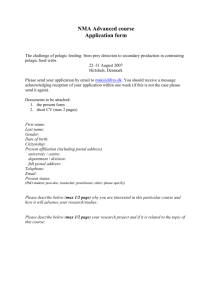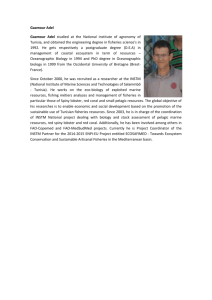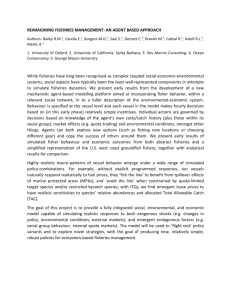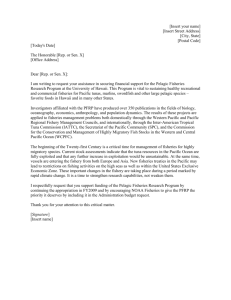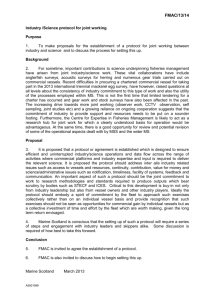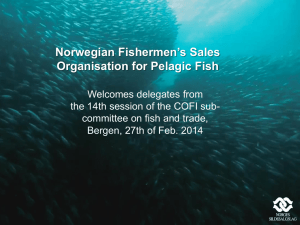Fisheries and Rural Development Group
advertisement
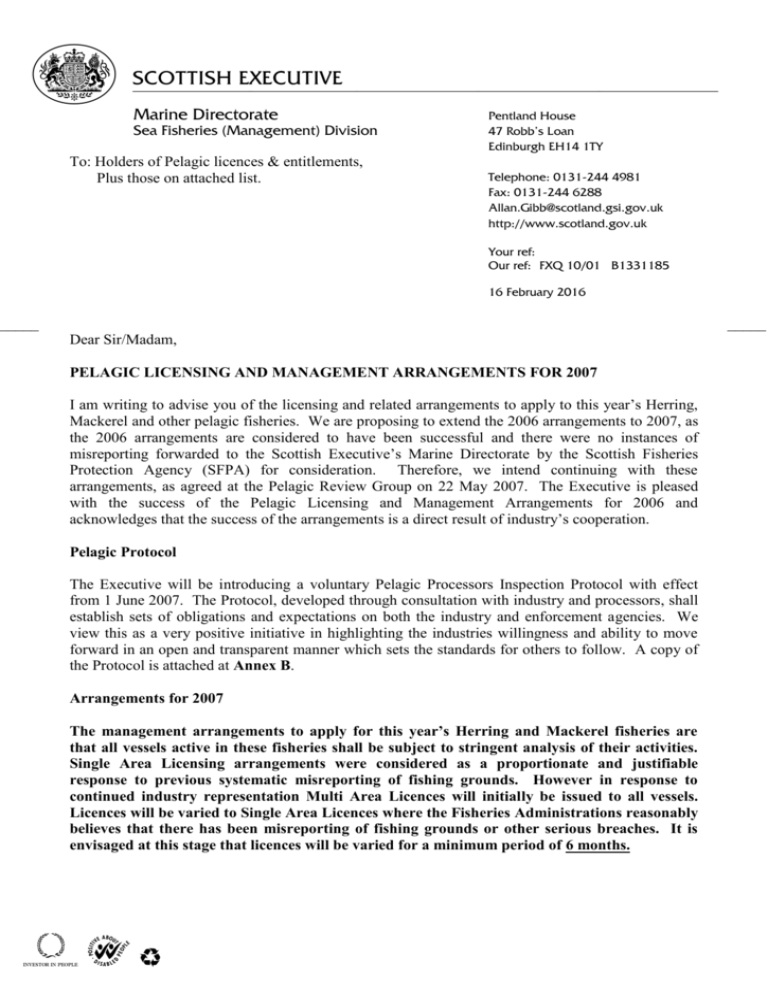
Marine Directorate Sea Fisheries (Management) Division To: Holders of Pelagic licences & entitlements, Plus those on attached list. Pentland House 47 Robb’s Loan Edinburgh EH14 1TY Telephone: 0131-244 4981 Fax: 0131-244 6288 Allan.Gibb@scotland.gsi.gov.uk http://www.scotland.gov.uk Your ref: Our ref: FXQ 10/01 B1331185 16 February 2016 _____ _____ Dear Sir/Madam, PELAGIC LICENSING AND MANAGEMENT ARRANGEMENTS FOR 2007 I am writing to advise you of the licensing and related arrangements to apply to this year’s Herring, Mackerel and other pelagic fisheries. We are proposing to extend the 2006 arrangements to 2007, as the 2006 arrangements are considered to have been successful and there were no instances of misreporting forwarded to the Scottish Executive’s Marine Directorate by the Scottish Fisheries Protection Agency (SFPA) for consideration. Therefore, we intend continuing with these arrangements, as agreed at the Pelagic Review Group on 22 May 2007. The Executive is pleased with the success of the Pelagic Licensing and Management Arrangements for 2006 and acknowledges that the success of the arrangements is a direct result of industry’s cooperation. Pelagic Protocol The Executive will be introducing a voluntary Pelagic Processors Inspection Protocol with effect from 1 June 2007. The Protocol, developed through consultation with industry and processors, shall establish sets of obligations and expectations on both the industry and enforcement agencies. We view this as a very positive initiative in highlighting the industries willingness and ability to move forward in an open and transparent manner which sets the standards for others to follow. A copy of the Protocol is attached at Annex B. Arrangements for 2007 The management arrangements to apply for this year’s Herring and Mackerel fisheries are that all vessels active in these fisheries shall be subject to stringent analysis of their activities. Single Area Licensing arrangements were considered as a proportionate and justifiable response to previous systematic misreporting of fishing grounds. However in response to continued industry representation Multi Area Licences will initially be issued to all vessels. Licences will be varied to Single Area Licences where the Fisheries Administrations reasonably believes that there has been misreporting of fishing grounds or other serious breaches. It is envisaged at this stage that licences will be varied for a minimum period of 6 months. Background Fisheries Administrations review each year the management arrangements to apply to Pelagic Fisheries, in light of circumstances and experiences of the past year’s fisheries. Pelagic stocks generally are relatively healthy (though concerns remain as to the current state of the North Sea herring stocks resulting from weak recruitment) but, nonetheless, they remain vulnerable to over-fishing. It is important therefore that appropriate steps are taken to ensure that pelagic fisheries remain healthy and viable. In 2006 Fisheries Administrations considered imposing Single Area Licensing (SAL) on the Pelagic fleet to tackle what was seen as the systematic misreporting of fishing grounds in previous years. Industry representatives opposed such an approach on the basis that some fishermen had not engaged in any misreporting and that others had not been aware of the consequences of their actions. The introduction of SAL would have removed some flexibility for vessels at sea and would have been a significant imposition on the Pelagic fleet. After some consideration Fisheries Administrations agreed to allow the Pelagic vessels to continue on Multi Area Licences (MAL) with the option to vary any vessels licence to a SAL if there was evidence of misreporting. Throughout 2006 the activities of the pelagic fleet were closely monitored using VMS data and there were no cases of suspected misreporting. Fisheries Administrations have therefore decided to continue with MAL arrangements in 2007 and trust that with the continued cooperation of the industry they will be as successful as in 2006. Procedures Vessel owners should be aware that voyages undertaken by their vessels undergo analysis. The activities of vessels are monitored and analysed for the purpose of ascertaining whether there are grounds to suspect a contravention of the law – for example, that Area of Capture has been misrecorded in the vessel’s logbook. This analysis uses intelligence available to the SFPA and from examination of documentation and reports submitted by vessels themselves. Where the SFPA obtains evidence, to the criminal standard, of contravention of the law by a holder of a Multi Area Licence it will report the case to Crown Office and Procurator Fiscal Service (COPFS) for consideration for prosecution. In addition to or where the SFPA obtains evidence that, on the balance of probabilities, a contravention of the law has occurred it shall report the case to the Scottish Executive’s Marine Directorate shall consider the report and whether it may justify variation of the vessel’s Multi Area Licence to become a Single Area Licence. For example the following procedures will be undertaken when there is reason to believe that Area of Capture had been mis-recorded on an EC logsheet or where there are other serious breaches. I. The Marine Directorate will notify the owners in writing giving a period of time for representation. II. The owners will be copied relevant documentation used by SFPA in making its assessment. This will be sent by recorded delivery to the first named owner on vessels’ certificate of registry. III. After the specified period has expired the Marine Directorate will consider the SFPA`s assessment and any representations duly made and will determine whether – on the basis of the information before it - it should exercise its discretion to vary the licence from a MAL to a SAL. IV. Where the assessment is that the licence should be varied to a SAL then the licence will be varied to become a single area licence for a period envisaged to be of 6 months. The Marine Directorate reserves the right to further extend this period by additional 6 month periods in appropriate cases, for example if mis-reporting of Area of Capture continues or other offences are committed. V. Prior to the completion of any 6 month period where a licence has been varied to a SAL, vessel owners will again be contacted advising as to the results of analysis of their vessel’s activities by SFPA over the preceding period. The owners shall have a further period for representation. After this further period has expired the Marine Directorate will consider the SFPA`s assessment and any representations duly made and will determine whether – on the basis of the information before it - it should exercise its discretion to extend by a further 6 months the variation to SAL. There are no planned changes to the current arrangements for other pelagic fisheries. Further details are set out in the annex to this letter, but in summary the main points are as follows: Multi Area Licences will be removed by way of variation to Single Area Licences where there is evidence of misreporting or other serious breaches. It is envisaged that these variations will be valid for a minimum period of 6 months. We believe this approach best serves a desired aim of individual accountability and responsibility. The issues of a separate licence to permit fishing for Atlanto-Scandian Herring (ASH) will be permitted for applicant vessels in all months, except July and August. Whilst vessels hold a licence for ASH their main licence will be suspended. Separate previously detailed licensing arrangements for Blue Whiting will continue. These arrangements reflect current circumstances in the pelagic fisheries, and will continue to be kept under review. The Marine Directorate reserves the right to impose a general Single Area Licensing Arrangement with no exemptions if there continues to be cause to suspect high levels of non compliance with these licensing and management arrangements. Accordingly the activities of these vessels will during 2007, be kept under close observation. If you have any questions about these arrangements, please address them in the first instance to your local port office which will, if necessary, take up any issues with the Fisheries Administrations. Yours faithfully, ALLAN GIBB Head of Sea Fisheries Compliance and Licensing Policy Sea Fisheries (Management) Division ANNEX A PELAGIC LICENSING AND MANAGEMENT ARRANGEMENTS FOR 2007 Licensing Arrangements 1. The Atlanto-Scandian herring (ASH) and Blue Whiting fisheries will be separately licensed. While licences for these fisheries are in place the vessel’s main licence will be suspended. Both ASH and Blue Whiting licences may be held concurrently during a single fishing trip, but fishing for Atlanto-Scandian herring will be prohibited during the months of July and August. Exchange/Uplift of licences 2. The arrangements for the exchange and uplift of ASH and BW licences during 2007 are detailed below. These set out the implications of the provisions of the Sea Fisheries (Licences and Notices) Regulations 1994 and which affect the time at which licences and related notices take effect (which can vary from immediately these have been delivered or given, where delivered personally to the Master on board the vessel, to 72 hours or more later if delivered by post through a Nominee). The effective date and time will be shown on the notices. However, please make sure you understand the arrangements so as to avoid difficulties during the fishing season. Exchange/Uplift in UK Ports 3. Providing sufficient notice (normally up to 24 hours) is given to a vessel’s licensing port office, licences may be exchanged while vessels are in any port in the UK where there is a Fishery Office. The facility to uplift/exchange licences will generally be available between 9am and 4pm, Monday to Friday. 4. In Scotland, uplift/exchange of licences may also be facilitated at weekends, where prior agreement has been reached with the vessels licensing port office and the issuing Fishery Office. These arrangements must be made prior to 4pm on the Friday and will only be agreed when staffing availability permits. Exchange/Uplift in Foreign Ports 5. Arrangements allowing for the remote exchange of licences while vessels are present in foreign ports will again be permitted providing sufficient (at least 24 hours) notice of exchange is given to the vessel’s licensing port office. Arrangements for this service will be in accordance with the terms of the Sea Fishing (Licences and Notices) Regulations 1994. Port Offices must be notified between 9am and 4pm, Monday to Thursday; and between 9am and 2pm on a Friday. This will allow time for licences to be made available and arrangements to be made, if necessary, for the inspection of the vessel by enforcement authorities of the country in which the vessel is present. Vessels Unable to Enter Port 6. Arrangements remain in place for vessels unable to physically come into port to exchange/uplift licences. Vessels are normally required to be tied up in port at the time of exchange/uplift, to allow for the physical inspection of the vessel. In exceptional circumstances, however, British Sea Fishery Officers (BSFOs) may, subject to notification as set out above, facilitate the uplift/exchange of licences for vessels which are not tied up alongside. Such requests will be considered on their merits and will only be permitted if a) the vessel is anchored sufficiently close to a port where there is a Fishery Office; b) it is available for on-board inspection; and c) the Master is able to provide BSFOs with safe passage to the vessel. Satellite Monitoring 7. Satellite monitoring data will continue to be closely monitored by the Fisheries Administrations as evidence of compliance with pelagic fisheries controls by fishermen. Appropriate measures, including the imposition of special licence conditions (such as re-instating single area licensing requirements) or administrative action in relation to quota management, may be taken if there is evidence of inappropriate behaviour. Verification of Pelagic Landings 8. Efforts will continue in the UK, alongside the additional requirements set out in EU Regulations, to improve systems to control and verify the volume of pelagic landings. These may involve general or targeted measures, on which the co-operation of industry (whether catchers or buyers) will be required. SCOTTISH EXECUTIVE June 2007 ANNEX B PELAGIC PROCESSING FACTORIES – INSPECTION PROTOCOL Purpose Significant progress has been made in ensuring the veracity of declared weights submitted from Scottish pelagic processors. Control measures now in place fully meet current EU requirements a process that has taken some time and has been achieved with the full cooperation of those processors involved. We are now in a position to present our process and systems to the Commission Authorities as very effective, perhaps even the most effective control measures of any country involved in the landing of pelagic fish. In an effort to be confident that this level of control is maintained, and in seeking continued responsible practices, we have developed the following protocol. This will ensure there is no room for complacency and help to avoid future accusations that control measures in Scotland are inadequate. The protocol is also required to formalise inspection procedures at premises over and above attendance by officers carrying out routine monitoring checks. The protocol and actions required will be discussed and agreed with each of the processing factories and will not replace the need for routine checks to be made on equipment and practices by local officers. SCOTTISH EXECUTIVE- MARINE DIRECTORATE (Compliance Policy Team) Shall: Maintain and update a catalogue for each processing factory. Each catalogue will Detail individual factories routine processing and calibration status, and provide photographs of all seals and labels affixed to allow cross reference by officers to ensure no tampering has taken place. Maintain a log of factory inspections and results noted. Be the contact point for discussion in the event that a factory is identified as potentially being in breach of any control requirements. Liaise directly with processors in dealing with issues relating to production, or their ability to maintain levels of compliance. Maintain regular contact with trading standards officers to discuss any potential changes that may impact upon operating processes and recalibration exercises. Provide feedback to processors on an annual basis the result from inspections carried out. Continue to press for an increase to the current 2% allowance for water. Making full use of factories production monitor results as additional evidence based argument for an increase. SFPA Shall: Carry out an annual full scale inspection of weighing equipment, including the tracing back of all wiring. An experienced engineering officer should accompany BSFOs with this. Full report copied to the Marine Directorate. Inspect the weighing system and maintenance log following each repair or maintenance. Summary of findings and photographs, forwarded to the Marine Directorate for recording. Carry out at least one comprehensive production monitor per factory per calendar six months to verify meter readings, compare flow rates, yields and outturn recordings. Communicate to factory/production manager, immediately prior to the exercise commencing, the suggested plan of action, including staff numbers, required to secure SFPA objectives whilst taking full account of health and safety considerations, product quality and minimising disruption to production processes. Carry out a full follow through of a weeks production in the factory at least once a year. In recognition of the call on time of key factory staff and to avoid disruption during key periods, this exercise will normally be undertaken out with the main factory processing months. The active cooperation of key personnel will further assist in minimising intrusion and potential time on site. This will include getting production records from production manager, checking these against records maintained by laboratory, and also follow through production records to cold store to ensure that records show entire catches. These records should then be followed up by comparing production records to purchase invoices sent to relevant Agents. The findings here should be recorded and compared with details that have been submitted to offices. The findings should be reported to the Department, although the Agency may wish to report the factory/ vessel/ Agent for criminal proceedings. Processors Shall: Advise the local fishery office immediately there is an issue arising that effects their ability to comply with control regulations. Facilitate inspections as required and make all documentation readily available. Communicate any issues of concern immediately in the first instance to the senior officer at the local Fishery Office. In the routine event of carrying out a follow through of a weeks production, processors may if they so wish, request that crosschecking of relevant records is carried out on the premises. This request should be made if the following conditions can be applied. That an adequate and separate office environment can be provided. That there is no obstruction or interference with those carrying out those crosschecks. That there is no restriction on times of entry or access to the dedicated office to allow this work to be undertaken. That at any point the records can be removed if information requiring further investigation or enquiry is found. PELAGIC MANAGEMENT ARRANGEMENTS 2007 OTHER INTERESTED PARTIES 1. 2. 3. 4 5. 6. 7. 8. 9. 10. 11. 12. 13. 14. 15. 16. 17. 18. 19. 20. 21. 22. 23. 24. 25. 26. 27. 28. 29. 30. 31. 32. 33. 34. 35. 36. 37. 38. 39. 40. 41. 42. 43. 44. 45. Aberdeen Fish Producers’ Organisation Anglo Scottish Fishermen’s Association Arbroath Fishermen’s Association Caley Fisheries Ltd, Fraserburgh Caley Fisheries Ltd, Peterhead Clyde Fishermen’s Association Clyde and South West Static Gear Association Cockenzie & Port Seton Fishermen’s Association Denholm Fishselling Ltd, Edinburgh Denholm Fishselling Ltd, Peterhead East Coast Licensed Small Boats Association Federation of Highlands and Islands Fishermen Fife Fish Producers’ Organisation Ltd Fife Fishermen’s Association Fishermen’s Association Ltd Herring Buyers Association Limited Highland & Islands Fishermen’s Association Hooktone Ltd IMT Marine Consultants Ltd LHD Limited Live Shellfish Traders’ Association Local Economic Development Services (East) Lunar Fishing Co. Mackinnons, Solicitors Mallaig & North West Fishermen’s Association Mull Fishermen’s Association North East of Scotland Fishermen’s Organisation Ltd Northern Producers’ Organisation Oban Port Association Orkney Fish Producers’ Organisation Orkney Fisheries Association Peter & J. Johnstone Ltd Peterhead Fishermen Ltd SAC Management Division Scallop Association Scottish Seafood Processors Federation Ltd Scottish Fishermen’s Federation Scottish Fishermen’s Organisation Ltd Scottish Fishing Services Association Scottish Pelagic Fishermen’s Association Scottish Whitefish Producers’ Association Shetland Catch Shetland Fishermen’s Association Shetland Fish Producers’ Organisation Ltd Skye & Lochalsh Fishermen’s Association 46. 47. 48. 49. 50. 51. 52. 53. 54. 55. 56. 57. 58. J Smith The 10 Metre and Under Association Ullapool-Assynt Fishermen’s Association West of Four Fisheries Management Group West of Scotland Fish Producers’ Organisation Western Isles Fishermen’s Association Westward Fishing Co. Wigtown Fishermen’s Association Alex Buchan Ltd Croan Seafoods Fresh Catch Pelagic Freezing (Scotland) Ltd United Fish Products Ltd Notices of Variation under the Sea Fishing (Licences and Notices) Regulations 1994 Recipient Recipient type Method of delivery Master n/a Master n/a Delivered Personally while he/she is on board the boat Sent by electronic means to the vessel i.e. by fax email etc Nominee Individual only Delivered Personally All Individual and for Company nominees delivered by hand Sending it to him/her by post at their address or place of business By leaving it at their address or place of business or in the hands of any person there All By transmitting it to the Nominee by electronic means at their address or place of business Nominee Nominee Nominee Time required to be treated as delivered or given Further time required to come into effect Total At the time the document is handed over None Immediately 24 hours after the time of communication Example Effective time/date on a variation handed over, posted, left or emailed at 10:00 on 1 July 10:00 on 1 July None 24 hours after the time of communication 24 hours 10:00 on 2 July 48 hours after midnight on the day of posting 24 hours 72 hours (from midnight)* 00:01 on 4 July* 24 hours after the time of communication 24 hours 48 hours 10:00 on 3 July 24 hours after the time of communication 24 hours 48 hours 10:00 on 3 July None 10:00 on 2 July * when sent by post if the variation would fall to be delivered on a Sunday or any place where when it is delivered there is a Bank Holiday or in Scotland is a local holiday it will be treated as delivered at the end of the next day which is not a Bank or local holiday. 10 SE Approved Version 1.1


